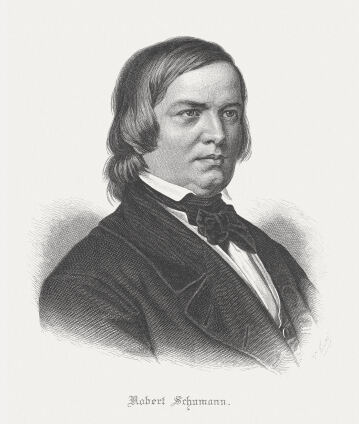Robert Schumann in his works

Music or literature? As a young man, Robert Schumann could not make up his mind; in the end, he chose the art of music. After a career as a pianist foundered due to injury, he concentrated entirely on composing – and very successfully! While works such as his famous piano concerto show Schumann as a master of the keyboard, pieces such as the Fantasy for Violin and Orchestra and the Nachtlied particularly reflect the sensitive poet in him. Here we present the composer in all his facets.
If you had to agree on a single composer as representative of German Romanticism, the choice would probably fall on Robert Schumann. What was Romantic about him was above all his preference for mysteries, his closeness to nature and his literary sensibility. After initially writing exclusively solo works for piano, Schumann only turned to other genres relatively late. He was already over 30 when he presented the music world with a symphony – which met with immediate success. All four of Schumann’s symphonies have been effortlessly able to hold their own in the repertoire of major orchestras ever since. This includes the Second, which was influenced by Bach and is conducted here by Daniel Harding. Schumann’s Fourth was at first met with incomprehension: the novel through-composed form caused confusion, which is why the work initially disappeared in a drawer for twelve years before Schumann presented it again in a revised form. Simon Rattle presents the extremely charming original version here.
As in Schumann’s individual compositions, hidden treasures can be discovered in his work as a whole. One of these is the Concert Piece op. 86, in which four horns are able to shine in solo parts that are as striking as they are virtuosic. Another rarity is the Nachtlied for choir and orchestra, which impresses with its poetic mood, dramatic intensification and elegiac final turn. While the Fantasy for Violin and Orchestra from his late work is more of an insider tip, the solo concertos for piano and cello have proved to be popular hits. Our selection features the legendary Martha Argerich as soloist in his Piano Concerto, which the Philharmoniker performed with Schumann’s wife Clara in 1883.
Our recommendations
- Undying fascination: The music of the “Golden Twenties”
- 15 years of the Digital Concert Hall: Highlights from members of the Berliner Philharmoniker
- Richard Strauss and his tone poems
- Grand Opera with the Berliner Philharmoniker
- A conductor recommends: Jakub Hrůša’s highlights
- Light music and favourite works with the Berliner Philharmoniker